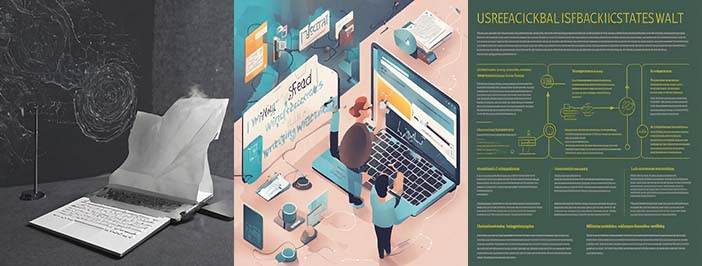The Black-Boxed Ideology of Automated Writing Evaluation Software
Antonio Hamilton University of Illinois Urbana-Champaign
Finola McMahon University of Illinois Urbana-Champaign

The rise of Automated Writing Evaluation software (AWE) has had, and will continue to have, profound effects on writing classrooms in the 21st century. As a form of what writing studies now calls "artificial intelligence," AWE mediates student and instructor activity (Huang & Wilson, 2021; Wilson et al., 2021) as well as shapes student response in AWE-equipped classrooms (Wilson & Roscoe, 2020). Additionally, recent research has shown that the variation in mediated interfaces impacts students' perception of writing feedback (Laflen, 2023). Despite false promises of freeing instructors from the drudgery of responding to student writing (Haswell, 2006), AWE can have cold emotional consequences on student writers (Herrington & Moran, 2001). There are well-documented deleterious effects when machines are used to score student writing (Ericsson & Haswell, 2006). In fact, recent quasi-experimental studies find that AWE used for formative assessment does not improve student writing and may even worsen it (e.g., Ernst, 2020). Rather than focus on the broader effects of AWE machine scoring, we present a more narrow investigation into the mechanisms by which AWE rhetorically operate and how computational inner workings of AWE are often obfuscated, obscured, or black-boxed (Latour, 1987; Burrell, 2016). We qualitatively document the rhetoric of AWE software such as Grammarly, Outwrite, or ProWritingAid, including the claims these software companies make in their online materials. Doing so equips Writing Studies teachers with ways to argue against the jargon, rhetoric, and black-boxing deployed by AWE companies.
The rest of this chapter has five parts. First, we review the concept of black-boxing and its implications. Through this review, we generate our research questions. Second, we describe our methods, including the origins of this paper in our graduate seminar from the Fall of 2021, and the AWE we investigate, i.e., Criterion, Grammarly, MI Write, Outwrite, ProWritingAid, Paper Rater, WriteToLearn, and VirtualWritingTutor. Third, we present our findings that detail the features of these programs, the language used by the companies to describe the black-boxed "artificial intelligence", and the accessibility of the software programs. Fourth, we discuss these findings and their implications. Here, we note that these programs rely on an ableist ideology of ease, purposeful use of functional illiteracy, and hyperjargonizing. After noting the limits of the study, we conclude that the language used by most of these software companies echoes current-traditional rhetoric approaches to the teaching of writing.






